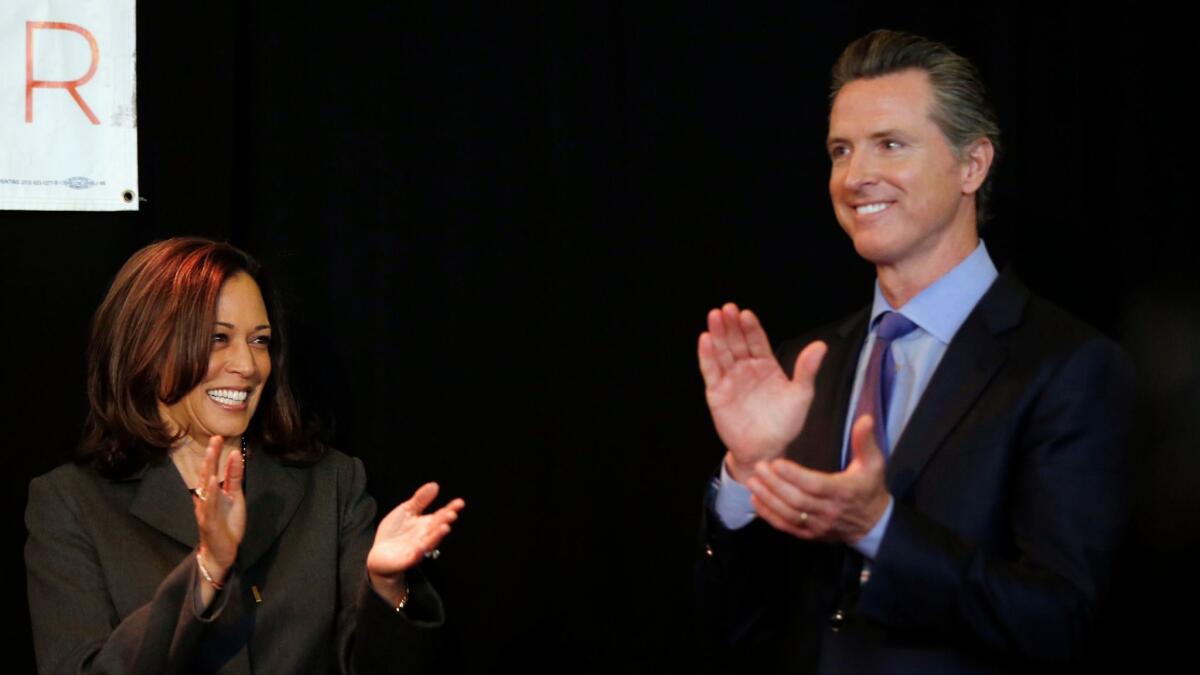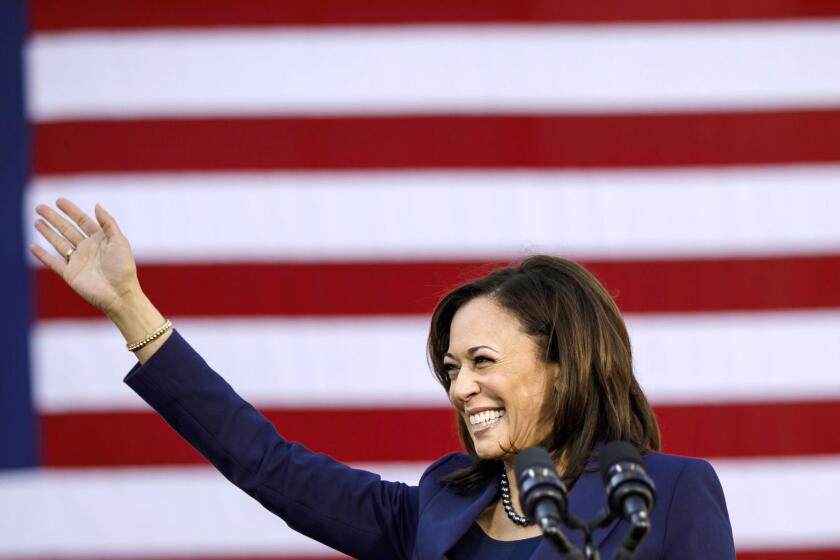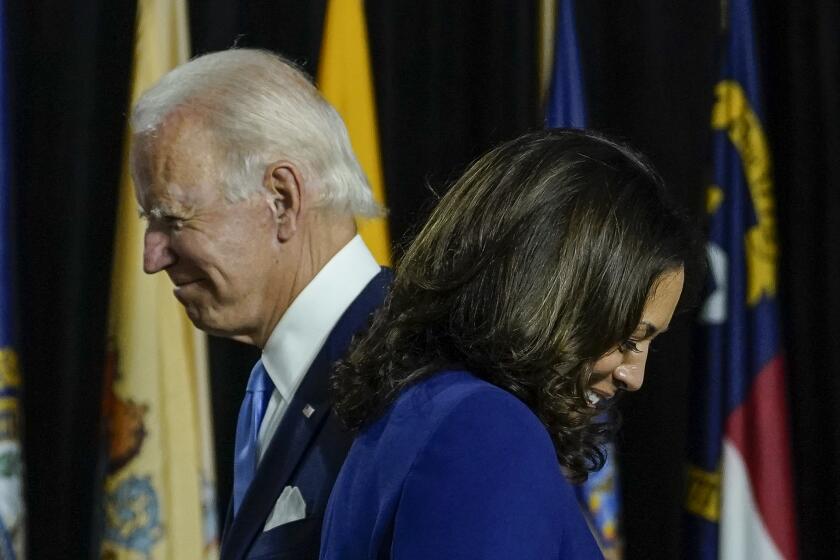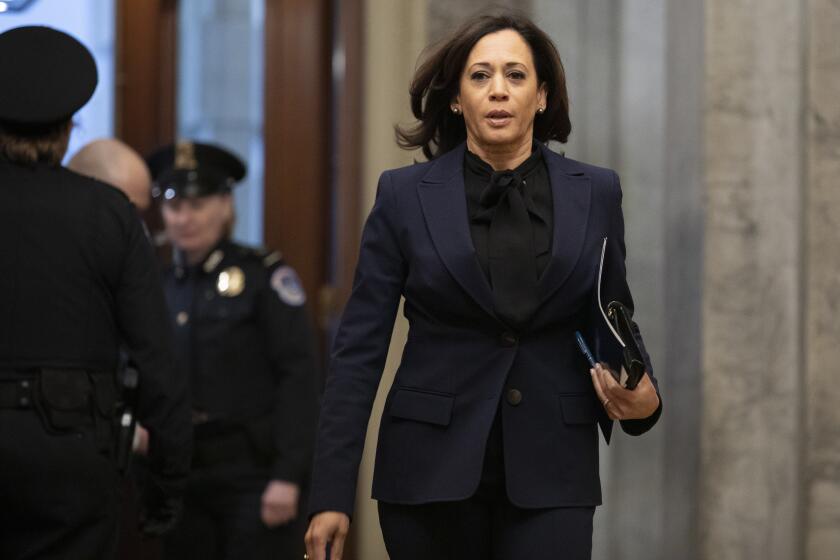With Kamala Harris as Biden’s VP pick, Newsom has a chance to appoint history-making senator

- Share via
SACRAMENTO — With California Sen. Kamala Harris now cemented as Democratic presidential candidate Joe Biden’s running mate, Gov. Gavin Newsom could soon face the politically perilous decision of whom to select as her replacement in the U.S. Senate.
The appointment promises to be one of the most consequential of his political career, both in California and in regard to any ambitions the Democratic governor may have for the White House. And it puts him at risk of upsetting some of the most powerful forces within his party no matter what he decides.
During a time of national reflection over the pervasive inequities and injustices suffered by Black Americans, Newsom will face significant pressure to appoint a Black woman to replace Harris. Harris is only the second Black woman in the nation’s history to serve in the U.S. Senate.
Conversely, an open seat would provide Newsom an opportunity to make history by appointing California’s first Latino senator. Though Latino public officials have ascended to other positions of power in California over the last two decades, the state’s most coveted political prizes — its two U.S. Senate seats and the governor’s office — have remained elusive.
Joe Biden has chosen California Sen. Kamala Harris as his running mate. She could be the first woman and first person of color to be vice president.
“There are so many factors that go into a decision like this for Newsom. Fundamentally, it’s about his legacy,” said Democratic strategist Rose Kapolczynski, who ran campaigns for former California Sen. Barbara Boxer for two decades. “At this moment in time, there is going to be a lot of pressure to appoint a person of color. The dynamics may be somewhat different in November and December, but I don’t think this national reckoning on racial justice is going away.”
Democratic insiders and strategists interviewed by the Los Angeles Times provided their thoughts on those who might be in Newsom’s top tier. They asked not to be identified in order to more freely discuss the merits of Harris’ potential successors.
That list includes: Reps. Barbara Lee of Oakland, Katie Porter of Irvine and Karen Bass of Los Angeles, who was also short-listed as a possible vice presidential nominee for Biden. Secretary of State Alex Padilla, a longtime political ally of the governor, also is at the top of the list, and Long Beach Mayor Robert Garcia appears to be gaining steam.
Newsom might reach back to his political roots in the Bay Area, a wellspring of political power that has produced California’s last three senators and the last two governors, by tapping Oakland Mayor Libby Schaaf or San Francisco Mayor London Breed. The governor could also decide to shore up his support in Southern California by selecting Los Angeles County Supervisor Hilda Solis, who served as U.S. Labor Secretary during the Obama administration, Los Angeles Mayor Eric Garcetti, Rep. Adam Schiff of Burbank or state Senate President Pro Tem Toni Atkins of San Diego.
Or he could stick to a politician who recently won statewide office, evidence of the ability to defend the Senate seat when the post comes before California voters in the 2022 election. Along with Padilla, that short list includes Lt. Gov. Eleni Kounalakis, Atty. Gen. Xavier Becerra, Controller Betty Yee and Treasurer Fiona Ma. Picking a statewide-office holder would also give Newsom a twofer since he would then have to appoint a replacement for the remainder of that person’s term in office.
A look at The Times’ coverage of Kamala Harris.
Whomever Newsom selects would serve the balance of Harris’ term in the Senate, which ends in January 2023, if the governor decides not to call a special election.
A spokesman for Newsom also said the governor wouldn’t even consider the possibilities until after the November election.
“It’s the furthest thing from his mind,” said Nathan Click. “The governor is squarely focused on leading the state’s response to COVID-19 and helping Californians during this global pandemic.”
Padilla, a former Los Angeles City Council president and state senator, has been one of Newsom’s most loyal political allies over the past decade, and chaired Newsom’s ill-fated run for governor in 2010. The Massachusetts Institute of Technology graduate has for years been mentioned as a possible successor to Democratic Sen. Dianne Feinstein, who gave Padilla his first major break in politics when she hired him as a staff member.
Mindy Romero, director of the USC Center for Inclusive Democracy, said Padilla would be a top contender if Newsom filled any Senate vacancy — including one that could occur if Feinstein decided to retire before the end of her term in 2024. Not only has Padilla won two statewide races for secretary of state, he also is California’s top Latino elected official in a state with the largest Latino population in the U.S. About 30% of California residents who are eligible to vote are Latino.
Harris pledged to ‘do everything in my power’ to help elect Biden.
“It would be incredibly significant, and I think he will be under pressure to appoint a Latino. It’s a long time coming in this state,” Romero said. “It’s a blue state. You put a Democratic senator in office and they do a good job, they will likely stay in office for decades. In that way it’s like the Supreme Court.”
That wasn’t the case the last time a California governor made a Senate appointment. Republican Gov. Pete Wilson in 1991 chose little-known moderate Republican state Sen. John Seymour of Orange County to succeed him in the U.S. Senate, which Wilson left when he was elected governor. Wilson saw Seymour as an ideological reflection of himself and praised the legislator’s prodigious fundraising abilities. A year after his appointment, however, Seymour was pummeled in the 1992 general election by Feinstein, who won by a 16-percentage-point margin.
The political landscape is even more treacherous today for the GOP. The percentage of Republican registered voters in California declined from 37% in 1992 to 24% this year. During that time, the percentage of Democrats dropped from 49% to 45%. Californians forgoing any partisan affiliation and registering as “no party preference” or “decline to state” increased from 10% in 1992 to 25% this year, putting them ahead of the GOP.
No Republican has won a statewide election in California since 2006.
State Sen. Holly Mitchell (D-Los Angeles) said she was hopeful that Harris’ replacement in the Senate would be a woman, adding that women continue to be underrepresented in every level of government across the country. Currently, women account for just 26 of the 100 members of the U.S. Senate — only 57 women have ever served in the upper chamber.
With P.V. Gopalan, an upright civil servant and doting patriarch, Kamala Harris forged one of the defining relationships of her life.
Correcting that glaring inequity is essential for the wellbeing of all Americans, Mitchell said, because women elected to political office elevate the importance of issues such as workers’ rights, child care, poverty and affordable housing.
“People who are impacted by those issues seem to fare better when more women are in office,” Mitchell said.
Mitchell said that, as a Black woman, Harris had also provided an essential voice in the Senate, speaking out on pay equity, the tragedy of Black men and women dying at the hands of police, and adequate healthcare. Mitchell hopes Newsom will replace that voice in the Senate.
For that and other reasons, Newsom would be hard pressed not to seriously consider Bass, who in recent months rocketed into national prominence as a potential vice presidential candidate. Bass, head of the Congressional Black Caucus, is a seasoned legislator who served as speaker of the California Assembly before her election to the House of Representatives in 2010.
Before entering politics, Bass worked as a community organizer in Los Angeles in the 1980s and ’90s, joining a cauldron of activism that included young civil rights leaders who went on to become the heart of L.A.’s political establishment — including former L.A. Mayor Antonio Villaraigosa, L.A. County Supervisor Mark Ridley-Thomas and state Sen. Maria Elena Durazo.
“Of course you would have to consider Congresswoman Bass, along with everyone else,” Durazo said. “Gov. Newsom would have an enormous pool of talent to pick from in California. There’s no shortage, and that’s a great thing.”
Though not well known throughout most of the state, the mayor of Long Beach would also be a history-making pick for Newsom. Garcia, 42, who is the youngest mayor elected in Long Beach, is an immigrant from Peru and is gay. He also was one of the most prominent Latino leaders in Southern California to endorse Newsom for governor during the 2018 race.
Times Staff Writer Jennifer Haberkorn contributed to this report.
More to Read
Sign up for Essential California
The most important California stories and recommendations in your inbox every morning.
You may occasionally receive promotional content from the Los Angeles Times.














